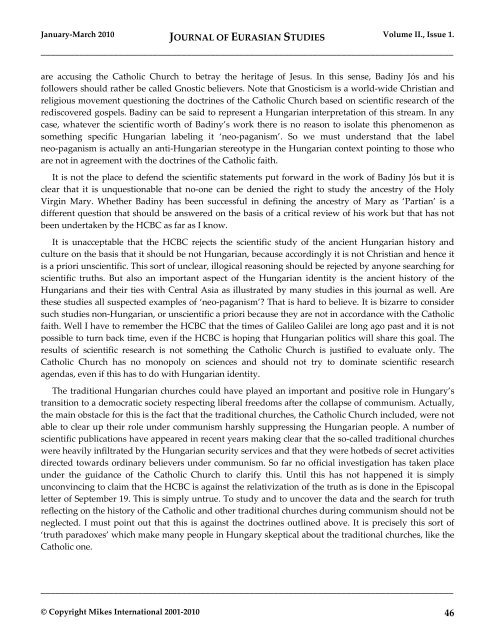EurasianStudies_0110..
EurasianStudies_0110..
EurasianStudies_0110..
You also want an ePaper? Increase the reach of your titles
YUMPU automatically turns print PDFs into web optimized ePapers that Google loves.
January-March 2010 JOURNAL OF EURASIAN STUDIES Volume II., Issue 1.<br />
_____________________________________________________________________________________<br />
are accusing the Catholic Church to betray the heritage of Jesus. In this sense, Badiny Jós and his<br />
followers should rather be called Gnostic believers. Note that Gnosticism is a world-wide Christian and<br />
religious movement questioning the doctrines of the Catholic Church based on scientific research of the<br />
rediscovered gospels. Badiny can be said to represent a Hungarian interpretation of this stream. In any<br />
case, whatever the scientific worth of Badiny’s work there is no reason to isolate this phenomenon as<br />
something specific Hungarian labeling it ‘neo-paganism’. So we must understand that the label<br />
neo-paganism is actually an anti-Hungarian stereotype in the Hungarian context pointing to those who<br />
are not in agreement with the doctrines of the Catholic faith.<br />
It is not the place to defend the scientific statements put forward in the work of Badiny Jós but it is<br />
clear that it is unquestionable that no-one can be denied the right to study the ancestry of the Holy<br />
Virgin Mary. Whether Badiny has been successful in defining the ancestry of Mary as ‘Partian’ is a<br />
different question that should be answered on the basis of a critical review of his work but that has not<br />
been undertaken by the HCBC as far as I know.<br />
It is unacceptable that the HCBC rejects the scientific study of the ancient Hungarian history and<br />
culture on the basis that it should be not Hungarian, because accordingly it is not Christian and hence it<br />
is a priori unscientific. This sort of unclear, illogical reasoning should be rejected by anyone searching for<br />
scientific truths. But also an important aspect of the Hungarian identity is the ancient history of the<br />
Hungarians and their ties with Central Asia as illustrated by many studies in this journal as well. Are<br />
these studies all suspected examples of ‘neo-paganism’? That is hard to believe. It is bizarre to consider<br />
such studies non-Hungarian, or unscientific a priori because they are not in accordance with the Catholic<br />
faith. Well I have to remember the HCBC that the times of Galileo Galilei are long ago past and it is not<br />
possible to turn back time, even if the HCBC is hoping that Hungarian politics will share this goal. The<br />
results of scientific research is not something the Catholic Church is justified to evaluate only. The<br />
Catholic Church has no monopoly on sciences and should not try to dominate scientific research<br />
agendas, even if this has to do with Hungarian identity.<br />
The traditional Hungarian churches could have played an important and positive role in Hungary’s<br />
transition to a democratic society respecting liberal freedoms after the collapse of communism. Actually,<br />
the main obstacle for this is the fact that the traditional churches, the Catholic Church included, were not<br />
able to clear up their role under communism harshly suppressing the Hungarian people. A number of<br />
scientific publications have appeared in recent years making clear that the so-called traditional churches<br />
were heavily infiltrated by the Hungarian security services and that they were hotbeds of secret activities<br />
directed towards ordinary believers under communism. So far no official investigation has taken place<br />
under the guidance of the Catholic Church to clarify this. Until this has not happened it is simply<br />
unconvincing to claim that the HCBC is against the relativization of the truth as is done in the Episcopal<br />
letter of September 19. This is simply untrue. To study and to uncover the data and the search for truth<br />
reflecting on the history of the Catholic and other traditional churches during communism should not be<br />
neglected. I must point out that this is against the doctrines outlined above. It is precisely this sort of<br />
‘truth paradoxes’ which make many people in Hungary skeptical about the traditional churches, like the<br />
Catholic one.<br />
_____________________________________________________________________________________<br />
© Copyright Mikes International 2001-2010 46

















